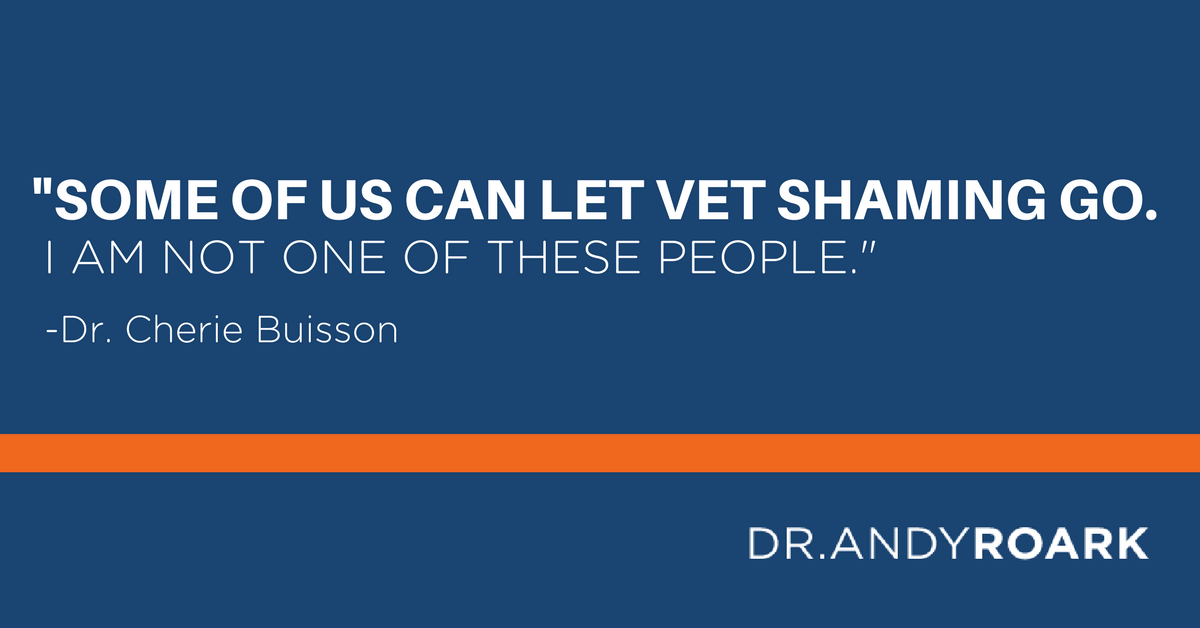

One of the hardest things about being a doctor is constantly being told you are wrong. Our clients tell us that Dr. Google, the breeder or their mother says so. Our colleagues debate online as to whether allowing clients to decline presurgical bloodwork makes you a bad doctor. If you do shelter or spay/neuter clinic work, you are constantly shamed for all the horrors you must be committing. I am envious of my veterinary brethren who can let this go. I am not one of those people. I try not to take things personally, but sometimes the negativity is overwhelming.
Here’s the thing: none of those people have to sleep on your pillow at night. None of them have a care in the world about the protection of your license. None of them is technically able to “cast the first stone”. There will always be someone practicing better medicine than you. Someone, some where will also be practicing far worse medicine than you.

I’ve had clients try to shame me for refusing them a prescription without an examination or for refusing to prescribe inappropriate treatment. I explained that I don’t do those things for my mother, so I’m certainly not going to do them for someone I barely know. Some vets would do both of those things with no problem. If you are one of them, you won’t find any shaming here. I don’t worry about what everyone else is doing.
Ultimately, peer pressure isn’t going to be an acceptable excuse if my license comes under scrutiny. I told the University of Florida Vet School class of 2015, “If the explanation for what you are about to do starts with ‘Against my better judgment, I………’ – DON’T DO IT”.
As veterinarians, we seem to spend an inordinate amount of time trying to please people and trying to keep people from taking things away from us. I was always taught to act from a position of power. Neither of these stances are powerful. Instead, spend your time trying to be happy and achieve your goals – it’s a whole lot healthier.
My mentor has never once complained to me about shelters offering vaccines, low-cost practices, online pharmacies or new clinics opening down the street. Do you know why? Because she only worries about her practice and how to make it better. She participates in clinical trials (you wouldn’t believe what a benefit these are to vets and clients alike), practices higher and higher standards of care and is always looking for ways to make her clinic stand out as excellent. She doesn’t waste her time trying to figure out how to make other veterinarians look bad. Tearing others down doesn’t make you look better. Standing confidently no matter what everyone else is doing DOES.
We should all strive to be better doctors, but remember that there is no one out there practicing perfect medicine. There are a whole lot of things that get in the way of practicing “ideal medicine”. Vet school is like a self defense class – you can learn how to do it perfectly in theory, but when it happens in real life, things get ugly. I think that being a really terrific doctor hinges not on how you execute the perfect workup of a case but on how you handle the cases where you must act without all the information. If I could always run every test I wanted, medicine would be easier. If all my patients and clients did what I told them, medicine would be easier. If medicine were easier, everyone would do it.
If you are watching everything your nearby clinics are doing – stop. If you are struggling constantly to satisfy difficult clients – stop. If you are staying up at night worrying how you are going to keep the specialty practice, corporate practice or clinic down the street from stealing your clients – STOP. Instead, try one or more of these:
1. Fire clients that make everyone’s life miserable. Ask your staff – are there clients that make you not want to come to work? Here’s a hint – if their name on the caller ID causes a clinic-wide groan and coin-flipping for who answers the phone, that’s your target. Decide who gives you the biggest headaches, and let them go. Focus on spoiling your good clients rotten. Your staff can’t concentrate on retaining clients with excellent customer service if they are required to be abused.
2. If you aren’t recommending lab work with every annual examination – start. Many clients are happy to do what’s best for their pet, but you have to let them know what’s best. This improves your medicine, increases revenue and protects pets by catching problems early.
3. Recommend that pets with chronic disease (kidney failure, thyroid problems, diabetes, etc) come in a minimum of every three months for a recheck and labs. Call to remind their owners – your software can probably link a reminder to the “Kidney Recheck” exam so you don’t have to remember. Even if they decline the kidney recheck, blood pressure and urine sample and only come in for the labs (they should be weighed as well) – that’s more information than you would have had on that patient otherwise.
4. Get involved with clinical trials. This is time consuming and best for a detail-oriented team. It’s a way to draw patients to your practice and to help people with financial issues get free services without giving them away yourself. In addition, you can be part of getting new medications approved and know what’s ahead for the veterinary profession!
5. Weigh all of your patients at every visit. If the elderly cat is losing weight at her nail trim, that should trigger your staff to ask if the owner is trying to get the cat to lose weight. If not, they should recommend a workup.
6. You look over records from other veterinarians all the time. As you’re reading – see if there’s anything they have been doing that would be a good idea for your practice. If you hire a relief vet – look over the record of every patient they saw – any habits there that you could adopt? Search for ways to make yourself more successful as a doctor and a business person, and the clinic down the street just won’t matter.
The rule for athletes applies to us as well: You have no competition. Don’t compare yourself to others or try to be better than anyone except the doctor you were yesterday.